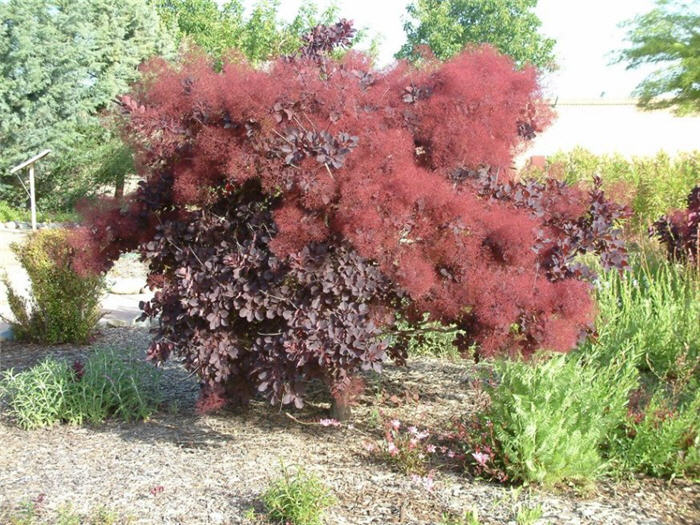| Botanical Name: Cotinus coggygria 'Purpureus' | |
| Common Name: Purple Smoketree |

-
Anatomy
-
Culture
-
Design
Plant Type
Tree, Shrub
Height Range
6-12', 12-25'
Flower Color
Pink
Flower Season
Summer
Leaf Color
Green, Purple
Bark Color
Grey
Fruit Color
n/a
Fruit Season
n/a
Sun
Full, Half
Water
Low
Growth Rate
Moderate
Soil Type
Clay, Loam, Rocky
Soil Condition
Average, Rich, Poor, Well-drained, Dry
Soil pH
Neutral
Adverse Factors
n/a
Design Styles
English Cottage, Mediterranean, Ranch, Spanish
Accenting Features
Fall Color, Showy Flowers, Unusual Foliage
Seasonal Interest
Summer, Fall
Location Uses
Background, Shrub Border, Foundation, Walls / Fences
Special Uses
Cut Flowers, Screen
Attracts Wildlife
n/a
Information by: Stephanie Duer
Photographer: Steve Mullany, Connon N.
Photographer: Steve Mullany, Connon N.
-
Description
-
Notes
Purple Smoketree is a deciduous shrub with a multi-stemmed, upright habit, growing about 12 to 15 feet tall and wide. Can be pruned to be a small tree. Leaves emerge a deep maroon purple and fade to dark green; fall color is orange to purple. Panicles of wispy dark pink appear in the summer after spring flowering, creating a billowing, soft effect.
Grow in full sun and well-drained soils; tolerates wide range of soils except wet, poorly-drained ones. Prefers somewhat infertile loams, but also does well in poor, rocky soils. Shallow fibrous root system makes it hard to grow anything but shallow-rooted groundcovers underneath. If bloom is not a concern, stems may be cut back hard in early spring each year to induce growth of vigorous new shoots with slightly larger than normal leaves. Such hard annual prunings will control size, but most likely at the expense of profuse flowering. Hard pruning is more often done on the purple-leaved cultivars as new foliage usually has the brightest color..